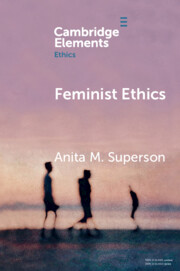Element contents
Feminist Ethics
Published online by Cambridge University Press: 04 March 2024
Summary
Keywords
Information
- Type
- Element
- Information
- Series: Elements in EthicsOnline ISBN: 9781108587839Publisher: Cambridge University PressPrint publication: 28 March 2024
